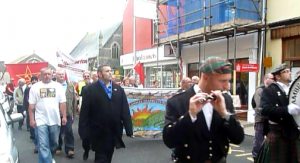•

On Saturday 18th August, CPGB-ML and Red Youth joined the march and rally to commemorate the anniversary of the Llanelli rail strike of 1911. The strike was memorable both for the slaughter of two workers by the British army, and for the heroic and steadfast spirit of resistance which animated the strikers and their many supporters. Our contingent was proud to support this event, distributing our literature as we marched through Llanelli.
At the rally many spoke about the spirited local campaign to prevent the downgrading of the Accident and Emergency service at the local Prince Phillip hospital. Sadly, a number of speeches seemed more concerned with point-scoring between Labour and Plaid Cymru, with each blaming the other for the threatened cuts coming down the line. A speaker from our party was invited by Llanelli Trades Council to say a few words, a welcome opportunity to put the historical events of 1911 in the context of today’s crisis of capitalism and the tasks facing the working class. The comrade spoke as follows:
“On behalf of the CPGB-ML I would like to thank Llanelli Trades Council for inviting me to say a few words on this day of commemoration.
When we recall the murder by the British army of John John and Leonard Worsell, we do not comfort ourselves with the false idea that this was the last time workers were slain by the British state. It is sufficient to recall
- the fatal battering of anti-Nazi campaigner Blair Peach in 1979;
- the judicial murder of Jean Charles de Menezes in 2005, shot seven times in the head whilst pinned to the ground in Stockwell tube station;
- the killing of bystander Ian Tomlinson at the G20 demo in 2010, now revealed to have been the subject of a criminal cover-up by the official pathologist;
- and the public execution of father-of-three Mark Duggan in 2011 on the streets of Tottenham.
All four were victims of state violence. In their case, the instruments of the state wore police uniforms. The army in recent years has been reserved for the slaughter of workers in faraway places – though we note that the Irish murdered in Ireland by the Parachute Regiment on Bloody Sunday (to mention but one of the myriad crimes against the Irish nation) were said by the colonisers to have met their deaths on “British soil”.
In remembering the events which took place in Llanelli one hundred years ago, we are inspired by the fighting spirit shown by working people resisting capitalism, by the spirit of non-cooperation which erupted even within the army itself, and by the electrifying effect this resistance had throughout the whole community. So far from being merely a historical footnote, the events of the 1911 Llanelli rail strike have real and urgent lessons for all those workers today who are fighting to prevent their living standards being ground down by a capitalist system in crisis.
The uprisings triggered last summer by the assassination of Mark Duggan revealed a depth of anger amongst young workers deprived of a decent future by the crisis of capitalism, and a willingness to fight back against a system that is effectively declaring war on the entire working class. Those uprisings were closer to the true spirit of 1911 than anything the TUC has yet come up with by way of “coordinating resistance”, despite the proven willingness of local government workers, doctors, construction workers, teachers, transport workers, students and Occupy activists to make a fight of it. All that is missing is the political leadership.
It is time to stop lying to the working class about the character of this crisis. The choice which faces us all is not “destructive cuts” versus “humane cuts”. The choice is between a warmongering capitalist barbarism spinning out of control – or socialism. The best commemoration of the martyrs, strikers and fighters of 1911 will come when the red flag is hoisted over Wales, Scotland and England. Bring it on! Join the struggle! Long live the spirit of 1911!”
After the rally, we marched up the hill to the cemetery where our two fallen comrades are buried. We laid one floral tribute (from the CPGB-ML) on the grave of Leonard Worsell, and a second (from Red Youth) on the grave of John John.
*****
SEE ALSO:
More photos of event (Flickr)
1911 special: Working-class struggles in Britain
Uprisings terrify the ruling class
YOUTH UPRISING SUPPLEMENT: Rage against capitalism
•
The following email was sent to us for promotion and we ask all anti-war and civil-liberties campaigners to spread it far and wide.
———-
I know our MPs are a shower of spineless crooks and opportunists, but what is going on here is a serious attempt by the UK state to criminalise non-support for OurHeroes(TM), and we should all be very very worried about this.
We all need to make as much of an uproar about this as possible, and that includes writing to our MPs in droves — there are LOADS of people out there who are with us on this, and we need to do everything in our power to stop these people being cowed into silence by the state, by politicians, and by the media.
PASS IT ON.
———-

Azhar Ahmed's post on Facebook
———-
Dear [insert MP or other ‘representative’s’ name here]
I should be most grateful if you would consider giving your support for the following.
**********
Petition to Mr Keir Starmer QC, Director of Public Prosecutions, Crown Prosecution Service.
Yorkshire Police have brought a charge against Azhar Ahmed for “a racially aggravated public order offence” for his comments on Facebook, which can be seen here: http://www.sabotagetimes.com/life/azhar-ahmed-and-scott-mchugh-a-tale-of-two-states/.
His comments amount to rage about civilian deaths that Nato and ISAF forces, including British soldiers, are seen as responsible for. There is nothing ‘racially aggravated’ about the comments, and they are not a direct plan for violence or incitement to violence. They are rage expressed in symbolic form, in terms of hell.
I believe this kind of charge brings our justice system into disrepute in the public conscience, is not in the public interest, and that this case should be urgently reviewed by the Director of Public Prosecutions himself, to consider whether it is a sensible interpretation of the law and whether bringing a charge is in the public interest.
In support of the above, I would like to remind you that the right of peoples to defend themselves against foreign invasion is enshrined in the UN Charter. Just as the French, Russian, Yugoslav, and other peoples had the right to defend themselves against German soldiers, and the Vietnamese people had the right to defend themselves against American soldiers, so too do the Afghan people have the right to defend themselves against British soldiers.
Many thanks
[Your name here]
•
From the International Report delivered to the CPGB-ML’s central committee on 1 October
A three-year inquiry into the death of hotel receptionist Baha Mousa at the hands of the British army in Iraq has finally admitted a degree of serious culpability, while endeavouring to confine the blame to the first battalion of a regiment (the Queen’s Lancashire Regiment) that has since been disbanded.
The inquiry found that the regiment was using the ‘five techniques’ (for torturing prisoners): ie, hooding, white noise, sleep deprivation, food deprivation and painful stress positions. This is contrary to the Geneva Convention and has been expressly banned for use by British soldiers since Edward Heath’s time, when army guidelines were revised to outlaw inhuman practices that had been in regular use in northern Ireland and were instrumental in exacerbating the resentment of the local population at the British occupation.
Essentially, the enquiry found that Mr Mousa, a widower and father of two young sons, had been beaten to death. However, the inquiry concluded that while the beating was the “trigger” for his death, his overall “vulnerable state” of exhaustion, dehydration, renal failure and exertion brought on by his treatment at the hands of the army contributed at least as much.
Orders banning the ‘five techniques’ were observed only in the breach. Mr Mousa and nine others picked up at the hotel where he worked were all subjected to this torture as well as to vicious beatings in an open building with no doors, where senior officers could have come in at any time to see what was going on.
The inquiry took the view that even if they did not know, they should have done. And in fact, the very fact that the ill treatment was taking place so openly provides irrefutable evidence that the soldiers administering the torture were confident of their superior officers’ approval.
It remains to be seen whether anybody will face criminal prosecution for these crimes, or for any of the hundreds of other cases of prisoner abuse that have taken place not only in Iraq, but everywhere that the British army has been present as an occupying force.
The inquiry was at pains to say that this behaviour is exceptional, and that the army as a whole is really very gentlemanly. Very many thousands of oppressed people all over the world have personal experience of the reality, which is very different.


